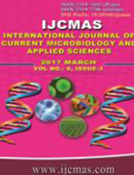


 National Academy of Agricultural Sciences (NAAS)
National Academy of Agricultural Sciences (NAAS)

|
PRINT ISSN : 2319-7692
Online ISSN : 2319-7706 Issues : 12 per year Publisher : Excellent Publishers Email : editorijcmas@gmail.com / submit@ijcmas.com Editor-in-chief: Dr.M.Prakash Index Copernicus ICV 2018: 95.39 NAAS RATING 2020: 5.38 |
Temperature rise due to climate change is expected to change pathogenicity of the pathogen. Temperature has a significant influence on growth and sporulation of rice leaf blast pathogen (M. oryzae). Both growth and sporulation were increased up to a temperature (27°C) and declined further in response to increased or decreased with temperature (32°C and 22°C). Various components of rice blast infection observed maximum at 27°C (optimal temperature) compared to suboptimal (22°C) and supra-optimal (32°C) i.e. growth and rate of growth in RSEDOMA media, lesion development and rate of lesion development in susceptible variety PRR78, sporulation and rate of sporulation in RSEDOMA media and susceptible variety PRR78. Rise in temperature leads to increase in growth and sporulation of M. oryzae in tropical and subtropical regions of the world, it’s to be expected to enhance in aggressiveness of M. oryzae that results rice blast epidemic in tropical and subtropical regions of the world. Therefore, the impact of temperature on infection components may use for development of crop loss assessment models, rice blast prediction models, evaluation of genotypes for the development of future plant diseases managements strategies.
 |
 |
 |
 |
 |